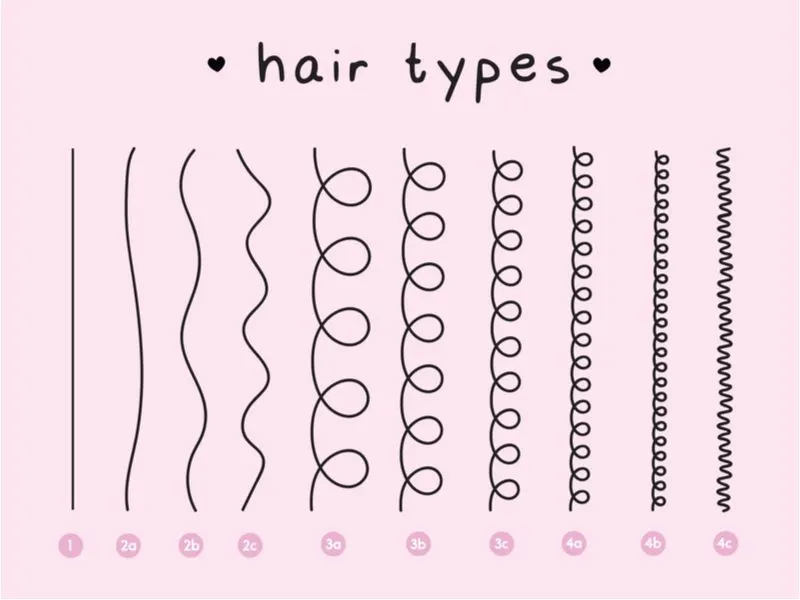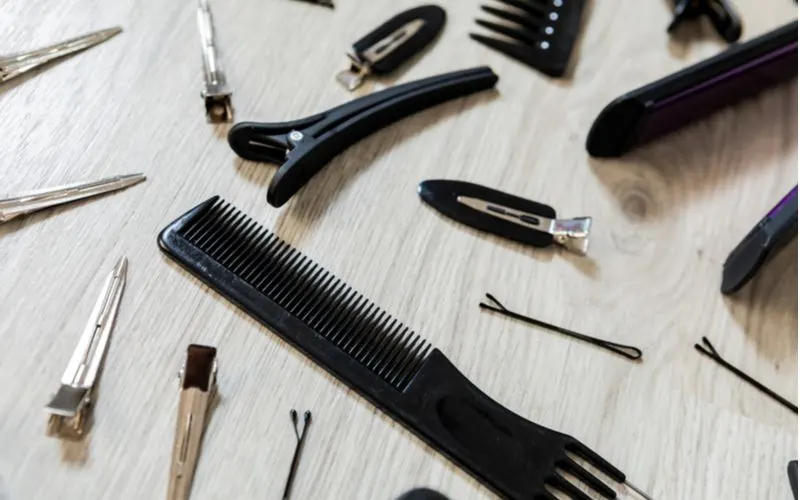Jump to:
How long does it take for bangs to grow out? If you’ve gotten bangs—or, worse, cut them yourself—and aren’t happy with the outcome, you’re probably hoping they’ll grow out as quickly as possible.
How Long Does It Take for Bangs to Grow Out?
Walking around with bangs too short or that don’t suit your style can be a real drag. Your hair frames your face, and bangs can make a big difference in your general appearance, calling attention to certain features while hiding others. When bangs go wrong, they can’t grow out fast enough. So, how long will it take to reverse your bang mistake?
It generally takes three to four months for bangs to grow out. If you’ve gone wrong with bangs, you undoubtedly want them gone ASAP. Unfortunately, hair doesn’t grow overnight. That said, there are steps you can take to promote growth—and to work with your bangs in the meantime.
Factors Affecting Bang Growth Rate
While three to four months is the average amount of time it takes bangs to grow out, the exact time frame depends on the individual. The amount of time it takes bangs to grow out varies according to:
- Genetics
- Hair texture and type
- Bang length
- Hair care routine
- Nutrition
Some of these factors, like your age and sex, you clearly can’t change. However, other elements, like nutrition and hair care, are in your control. If you take care, you can help your bangs grow out faster. This guide explains what you can do.
1. Genetics

fizkes/Shutterstock
While you can’t change your genes, it’s still helpful to understand how your profile impacts your hair growth. This will also influence the answer to the question, “how long does it take for bangs to grow out.”
Sex
In general, male hair grows faster than female hair. This is likely due to hormonal differences. For example, testosterone is known to create thicker, stronger strands of hair. This may also make male hair less prone to breakage, which can impede growth progress.
Age
Your age is another factor impacting hair growth. Most people experience the fastest hair growth between 15 and 30 years of age. After this point, the follicles slow down, and some stop working altogether. This is also why some people lose hair with age.
Rate of Hair Growth
Genetics impact every characteristic of your hair, including density, color, and texture. Your genes also affect how long your hair grows and how fast it grows. Some people grow more hair, faster and longer, than others. It’s in their DNA.
2. Hair Texture and Type

Tales of Stars/Shutterstock
While you can’t change your hair texture or type, you can alter it temporarily. Understanding how your hair texture and type impacts bang growth—or, better said, the appearance of growth—can be helpful.
Hair Texture
Hair ranges in texture from curly to straight. There are even precise definitions for different types of curls. In general, if your hair is curlier, your bangs will look shorter. Straightening your bangs can make them appear longer, as if they’re growing faster (although they technically aren’t).
Hair Type
Hair also comes in various types, from thick and robust to fine and thin. Thin hair may look less voluminous so that short bangs stand out starkly. Working with volumizing products can create thicker, denser locks, making it easier for bangs to fade into the background.
Read Next: How to Tease Hair
3. Bang Length

Remark_Anna/Shutterstock
Logically, the shorter your bangs are, the longer it will take them to grow out. There are three stages to hair growth, anagen (active growth), catagen (transition phase), and telogen (resting phase before the hair falls out).
On average, hair grows about a one-half inch every month while in the growing or anagen phase. Different strands are in various stages and thus seem grow at varied rates. That’s because a small percentage of your hair is not actively growing at any given time; it’s resting or shedding. Overall, half an inch per month should add up to six inches of growth annually.
4. Hair Care Routine

Prisca Laguna/Shutterstock
Your everyday hair care habits impact your ability to grow out your bangs.
Hair Cleaning
Make sure to shampoo and condition your hair regularly, but not every day, which can cause breakage. Two times a week is usually sufficient. Further, use hair masks or hair oils to add moisture if needed.
Heat Styling
Avoid heat styling, which causes dryness and breakage. While this doesn’t slow down the actual hair growth, it interferes with the process. When hair gets broken off at the ends, it will appear shorter, as if it were taking longer to grow. Minimize hair drying and straightening.
Read Next: How to Straighten Hair Without Heat
Hair Styles
Certain hairstyles can also interfere with hair growth, causing breakage that makes bangs appear shorter. Avoid super tight styles, like sharp clips or bobby pins that might cause fissures and dents.
Hair Coloring
If possible, try to avoid coloring your hair when growing out bangs. Dyes tend to dry out strands and make them more brittle and breakage-prone. Bleaching hair is incredibly damaging, so avoid it.
5. Nutrition

Prostock-studio/Shutterstock
Nutrition plays a big part in how fast your hair grows and how strong and healthy it is.
Diet
A hair-healthy diet includes plenty of protein and healthy fats, especially omega-3s. Include eggs, turkey, fish, and nuts into your regular meal planning. Fatty fish and avocados are excellent sources of omega-3s.
Other great nutrients for healthy hair include iron, zinc, selenium, and vitamins E, C, and A. Eat foods like kale, broccoli, sweet potatoes, kiwi, carrots, blueberries, guava, and whole grains to get these vitamins.
Supplements
Getting all the nutrients you need for strong hair growth from food and drink alone can be challenging. The right supplements and vitamins can help boost your diet. Look for items containing goods like biotin, keratin, and collagen.
Please note that you should always consult a doctor before making any significant changes to your diet or taking a supplement. Even if the items are all-natural and organic, consult a physician. Some supplements can cause side effects or interact with other medications.
Things to Consider
With the information above, it’s easy to create a quick list of dos and don’ts that can help your bangs grow faster. Here’s what you can do to spur fast growth. Do:
- Work with your natural hair texture and type to address short bangs. For example, adding volumizing products to thin hair can make it easier to blend blunt bangs.
- Use hair masks and oils to restore moisture to your strands, minimizing the likelihood of breakage, which can make bangs appear shorter.
- Eat a hair-healthy diet containing avocado, turkey, lean proteins, eggs, nuts, and fatty fish.
- Take supplements to spur hair growth, prioritizing goods with ingredients like collagen, biotin, and keratin. Consult a doctor before starting any supplements.
Here’s what you should avoid to maintain steady bang growth. Don’t:
- Wash hair too frequently. Excessive washing dries out the strands, further increasing the likelihood of breakage.
- Use heat styling like straighteners and blow dryers, which make hair dry and brittle, increasing the likelihood of breakage that will shorten bangs.
- Use harsh clips or barrettes to hold bangs out of the way. These can likewise cause breakage and impede growth progress.
- Use excessive harsh products on hair, like bleach. Dyed hair becomes brittle and weaker, making it more prone to breakage.
If you’re eager for your bangs to grow, follow the above dos and don’ts. While there is no guaranteed recipe for overnight hair growth, these steps can increase the odds that you will grow your bangs out faster.
Frequently Asked Questions

Pixpan_creative/Shutterstock
When you’re wondering how long it takes bangs to grow out, other questions may arise. Here are answers to some of the more common queries people ask related to the topic.
How Can I Make My Bangs Grow Faster?
You can encourage healthy, faster hair growth by eating a nutritious diet rich in omega-3 fatty acids, protein, iron, and other essential vitamins and minerals. Further, avoid bad habits that can cause hair breakage and impede growth, like harsh hair clips and heat styling.
Are Bangs Easy to Grow Out?
Growing out bangs takes patience. Apart from eating a healthy diet and practicing good hair care, you can’t do much to speed the process. Until your bangs are long enough to blend back into your regular hairstyle, you can try to hide them by clipping them to the side.
Do Bangs Grow Faster Than Hair?
Bangs don’t grow faster than the rest of your hair. It might seem like they are growing faster because they are shorter, and differences in length thus become more pronounced. It generally takes three to four months to grow out bangs.
What to Do If You Hate Your Bangs?
If you are eager for your bangs to grow out fast, eat a nutritious diet, and avoid damaging your hair with harsh dyes, heat styling, or tight hairstyles. These habits will cause hair to break, making it appear shorter and interfering with growth.
How Long Does It Take for Bangs to Grow Out?

Amelia Fox/Shutterstock
In general, expect it to take three to four months for bangs to grow out. Don’t stress. You won’t be stuck with the bangs you hate forever! That said, it will require some time and patience until you’ve got your old hair back. The above guide provides some pointers on how to spur growth.
